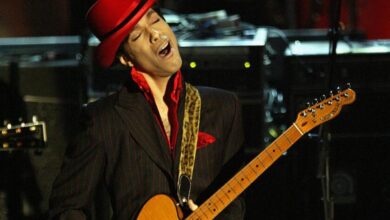Notes in the Stillness: The Royal Marines’ Unforgettable Rendition of “The Sound of Silence”
At the 2020 Mountbatten Festival of Music inside London’s Royal Albert Hall, the house lights fell away until a single beam revealed Band Lance Corporal Sam McIndoe holding a clarinet. A charged stillness gripped the hall as the full orchestra of the Bands of HM Royal Marines began weaving Paul Simon’s haunting melody. That opening breath-soft phrase seemed to dissolve the thousand-strong audience, leaving only woodwinds and memory drifting through the velvet air of the dome.
Though “The Sound of Silence” was born as a fragile folk tune in the 1960s, this reimagining drew on modern grandeur, echoing the song’s global resurgence after Disturbed’s 2015 version. McIndoe’s clarinet sang the original vocal line while French horns laid down minor harmonies that rose and fell like a distant tide. Reverent yet cinematic, it showed how a military band can step outside marches into elegiac pop drama with effortless grace.
Then came the strings—yes, even Marines take up violins—ushering in a glacier-slow build that swelled toward muted trumpets. Flutes hovered delicately above, like seabirds circling a harbor breeze. Midway, the corps of drums introduced a heartbeat cadence on side-drums, shifting the piece from introspective ballad into solemn military tribute.
Such precision and feeling come from one of the hardest dual pathways in music and service. Each musician first endured fifteen weeks of Royal Marine Commando training before enrolling at the Royal Marines School of Music, spending up to three years mastering theory, orchestration, and drill. The result is a corps equally capable of carrying stretchers in combat or sight-reading Mahler in concert.
Royal Marines bands trace their role back to naval history, performing aboard ships and serving as stretcher-bearers in wartime. More than two hundred musicians gave their lives by 1945, the highest casualty rate of any service branch. That legacy lingered in the performance: when the low brass delivered the bridge’s descending line, it felt like a whispered remembrance of absent comrades.
The Mountbatten Festival itself honors naval tradition, named for Admiral of the Fleet Lord Louis Mountbatten. Every ticket supports service charities, funding veteran rehabilitation and scholarships for bereaved families. In that light, choosing “The Sound of Silence” carried sharp resonance—a meditation on unheard voices, performed by servicemen in immaculate dress blues.
Earlier in the evening, a short film on resilience and mental health played across giant LED screens, framing the song as a reflection of struggles many personnel carry silently after deployments. As the orchestra reached the line “people talking without speaking,” the atmosphere shifted—listeners tethering lyrics to lived experience, an emotional ambush delivered without a single spoken word.
At the midpoint, the Corps of Drums advanced, white belts catching the stage lights. Snare rolls swelled into thunder, then tapered into delicate rim taps echoing the song’s ticking-clock tension. Buglers answered the clarinet in close harmony, and suddenly the Royal Albert Hall felt like an open parade ground beneath stars.
The reaction was instant and overwhelming. Gasps gave way to tears, then to applause so thunderous that the conductor had to raise both hands to quiet the hall before the closing notes. Within hours, clips spread online, drawing millions of views and comment threads filled with veterans thanking the band for “speaking my silence aloud.”
Older audience members spoke of wartime broadcasts, while younger listeners compared the Marines’ restrained grandeur to viral renditions by Pentatonix and Disturbed. This version somehow bridged both: nostalgia wrapped in harmonies paired with the cinematic intensity demanded by modern ears raised on epic soundtracks.
Where Simon & Garfunkel offered delicacy and Disturbed thundered with power, the Marines embraced expansiveness. The clarinet’s plaintive line met velvet brass chords, and at one point, a sudden hush left the hall breathless before percussion snapped the rhythm alive again. Here, silence wasn’t absence but another instrument, played with reverent care.
Royal Albert Hall’s famous acoustics made every gesture resonate. Even a single triangle note rippled to the rafters. From the conductor’s podium, carefully placed pauses allowed the natural echo to blossom, creating the illusion of hidden choirs joining the band. It was a demonstration of how silence and space can be sculpted into music itself.
Ironically, a song once carried by anti-war protestors found new power in the hands of a military ensemble. Far from contradicting its roots, the Marines reframed it as dialogue: soldiers performing a hymn about unheard voices. The symbolism felt especially urgent in an age when mental health is finally breaking free from silence.
Beyond festival stages, the Royal Marines Band Service brings music into schools, hospitals, and isolated garrisons, using melody to build bridges where words fail. Their repertoire runs from Holst to Beyoncé, yet “The Sound of Silence” endures as a centerpiece—played in disaster zones, on NATO stages, and in community halls alike. Each time carries echoes of that Royal Albert Hall hush.
As the final chord dissolved into the high dome, the conductor held his baton aloft until every echo vanished. Only then did the hall erupt—foot-stomps, cheers, the clink of medals on tunics. That wave of gratitude revealed the performance’s true power: a reminder that even the most disciplined soldiers use art not as escape, but as the loudest voice for truths silence alone cannot hold.





